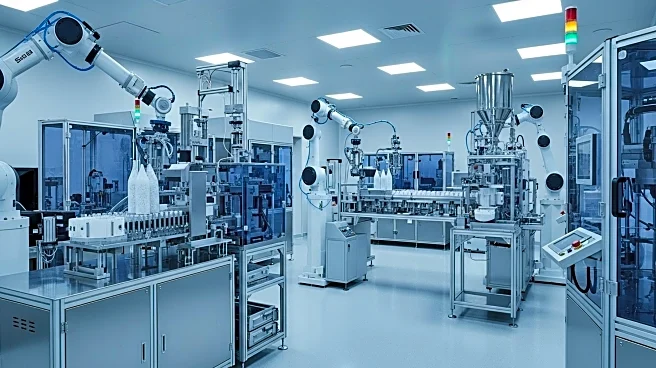What's Happening?
Lupin, an Indian pharmaceutical company, has announced plans to establish a new manufacturing facility in Coral Springs, Florida. The facility is expected to involve a cumulative investment of $250 million over five years, focusing on research and development, infrastructure, and capital expenditures. The new site will have the capacity to produce more than 25 critical respiratory medicines. Lupin's stock rose by 3.6% following the announcement, breaking a four-session losing streak. The company is set to receive tax credits and incentives from the state of Florida, which could help mitigate geopolitical risks such as tariffs.
Why It's Important?
The establishment of a new manufacturing facility in the U.S. is a strategic move for Lupin, potentially enhancing its ability to navigate geopolitical challenges and tariffs. This investment could strengthen Lupin's position in the U.S. pharmaceutical market, particularly in the production of respiratory medicines, which are crucial for treating various conditions. The facility's development may also contribute to local economic growth through job creation and increased demand for local services. Additionally, the tax incentives from Florida could provide financial relief, allowing Lupin to allocate resources more effectively.
What's Next?
Lupin's new facility is expected to be operational within five years, with ongoing investments in R&D and infrastructure. The company may continue to seek strategic partnerships and collaborations to expand its market presence in the U.S. and globally. Stakeholders, including investors and local government officials, will likely monitor the project's progress and its impact on Lupin's financial performance and market share. The pharmaceutical industry may also observe Lupin's approach to managing geopolitical risks and leveraging tax incentives as a model for future investments.
Beyond the Headlines
The decision to build a manufacturing facility in the U.S. reflects broader trends in the pharmaceutical industry, where companies are increasingly seeking to localize production to reduce dependency on international supply chains. This move could also influence other pharmaceutical companies to consider similar strategies, potentially reshaping the industry's global manufacturing landscape. Ethical considerations may arise regarding the environmental impact of the new facility and the company's commitment to sustainable practices.








